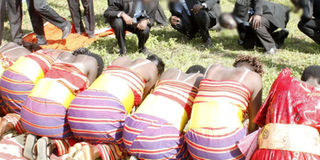Kibuku,Kamuli leaders decry forced marriages

A traditional marriage ceremony in Lira District in June 2018. Cases of forced marriages have been rampant in Kibuku and Kamuli since lockdown. PHOTO/FILE
Leaders in Kibuku and Bududa districts have decried the rampant cases of forced marriages among teenage girls during coronavirus-related lockdown.
“We are getting numerous reports of early and forced marriages. Lack of food and money in this lockdown is forcing parents to give away their daughters,” Ms Sarah Obore, the programme manager of Kadama Widows Association (KWA), told Daily Monitor at the weekend.
Ms Obore urged government to address the problem and the consequences of the measures put in place to combat Covid-19.
The association rescued a 16-year-old pupil of Budaka Muslim Primary School from being married off in Bwase Village, Budaka Sub-county in Budaka District in May.
The groom’s family had reportedly paid a sack of cassava flour as part of bride price and pledged to pay the remaining when the lockdown is lifted.
Ms Annet Naula, a resident, said girls are being forced to get married.
“One of our neighbours is furious because her daughter has refused to get married so that he gets dowry,” she said.
Ms Esther Namuduwa, the officer-in charge of the Child and Family protection Unit at Budaka Central Police Station, acknowledged the challenge.
“Such cases are many because children are at home with parents who look at a girl child as a source of financial support to the family,” she said, adding, that they had not yet compiled the list of the reported cases.
Ms Namuduwa, however, said most cases related to forced and early marriages are not reported to police.
Ms Miriam Cherukut, the programme manager of Association of Women’s Organisations in Uganda, said lockdown had worsened the levels of violation of girls’ rights.
Ms Cherukut said Budaka, Tororo, Pallisa and Kibuku, among other districts, have been having about 50 per cent of girls getting married before the age of 18 but now this is likely to increase.
A March study conducted by the Bukedi Action for Integrated Development Initiatives-International, an NGO, showed that teenage pregnancy in Kibuku stood at 37 per cent among girls aged 15-19 years.
Ms Shibah Namulindwa, the Action Aid programme officer, eastern region, urged government to support the needy to reduce the cases.
“The government has not supported its citizens to withstand the effects caused by the outbreak of coronavirus,” she said.
Mr Steven Twinomugisha, the Kibuku police commander, asked parents and local leaders to report the cases.
“If we can join hands, the vice will be kicked out,” he said.
Meanwhile, Kamuli and Namutumba districts have topped Busoga Sub-region in sexual violence against women and children during the lockdown, call-in records at Nyonga Women’s Shelter, a facility counselling and helping in the mediation of survivors of gender-based violence, show.
The findings are based on calls made between late March when President Museveni announced the lockdown and June 4 when public transport was opened up. The shelter was constructed in 2017 by Women Rights Initiative (WORI) .
Ms Rose Kagere, the WORI team leader, at the weekend said following transport challenges and travel restrictions, they set up a call centre to track and support the survivors.
“Most callers that needed help were coming from these particular districts. For Kamuli, we recorded 68 phone cases, Namutumba 59, Iganga (43) and Luuka (38). All were call-in cases that needed attention,” she said.
Mr James Mubi, the Busoga East police spokesperson whose jurisdiction Iganga and Namutumba districts fall, said: “Yes we have such cases, but we don’t know where WORI got such figures. However, gender-based violence against women during the lockdown has been high due to poverty.”




